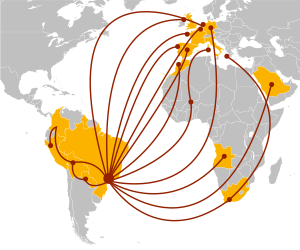First Command of the Capital: Difference between revisions
More languages
More actions
m (Changed type of reference for note) Tag: Visual edit |
General-KJ (talk | contribs) No edit summary |
||
| (2 intermediate revisions by one other user not shown) | |||
| Line 1: | Line 1: | ||
[[File:PCC international cocaine routes.svg|thumb|This is the usual route of international cocaine trafficking organized by the FCC. The drug is produced either in Colombia or Bolivia, then arrives in Brazil through the Paraguayan border. It leaves in containers from the Santos Port, usually destined to Belgium (5.4 tons), followed by Spain (2.2 tons), France (750kg) and other countries such as Morrocco, Angola, England and others, based on data gathered by Brazilian federal police in 2018.]] | |||
The '''First Command of the Capital''' ('''FCC''')<ref group="lower-alpha">Portuguese: Primeiro Comando da Capital (PCC)</ref> is a [[Federative Republic of Brazil|Brazilian]] criminal organization established in São Paulo in 1993, and it's today considered the largest drug cartel in Brazil, with about 112,000 members.<ref>{{Web citation|newspaper=Último Segundo|title=Saiba quais são as principais facções criminosas do Brasil|url=https://ultimosegundo.ig.com.br/policia/2021-10-07/saiba-quais-sao-as-principais-faccoes-criminosas-do-brasil.html}}</ref> | The '''First Command of the Capital''' ('''FCC''')<ref group="lower-alpha">Portuguese: Primeiro Comando da Capital (PCC)</ref> is a [[Federative Republic of Brazil|Brazilian]] criminal organization established in São Paulo in 1993, and it's today considered the largest drug cartel in Brazil, with about 112,000 members.<ref>{{Web citation|newspaper=Último Segundo|title=Saiba quais são as principais facções criminosas do Brasil|url=https://ultimosegundo.ig.com.br/policia/2021-10-07/saiba-quais-sao-as-principais-faccoes-criminosas-do-brasil.html}}</ref> | ||
It established itself as an organization fighting against repression inside Brazilian prisons, in direct response to the state-sanctioned execution of 111 prisoners in the Carandirú massacre in 1992 by the military police. | It established itself as an organization fighting against repression inside Brazilian prisons, in direct response to the state-sanctioned execution of 111 prisoners in the Carandirú massacre in 1992 by the military police. | ||
Nowadays, the FCC acts essentially like any capitalist business, under a corporate structure with about 12 directors and about 1,000 managers, with the majority of their members receiving less than a minimum wage, and operating mainly for profit. | Nowadays, the FCC acts essentially like any capitalist business, under a corporate structure with about 12 directors and about 1,000 managers, with the majority of their members receiving less than a minimum wage, and operating mainly for profit. The organization is worth about $200 million by heading an international business dedicated to trafficking cocaine, mostly destined to [[Europe]]. | ||
== References == | ==References== | ||
<references /> | <references /> | ||
=== Notes === | ===Notes=== | ||
<references group="lower-alpha" /> | <references group="lower-alpha" /> | ||
[[Category:Drug cartels]] [[Category:Organized crime groups]] | |||
Latest revision as of 19:32, 21 November 2024

The First Command of the Capital (FCC)[a] is a Brazilian criminal organization established in São Paulo in 1993, and it's today considered the largest drug cartel in Brazil, with about 112,000 members.[1]
It established itself as an organization fighting against repression inside Brazilian prisons, in direct response to the state-sanctioned execution of 111 prisoners in the Carandirú massacre in 1992 by the military police.
Nowadays, the FCC acts essentially like any capitalist business, under a corporate structure with about 12 directors and about 1,000 managers, with the majority of their members receiving less than a minimum wage, and operating mainly for profit. The organization is worth about $200 million by heading an international business dedicated to trafficking cocaine, mostly destined to Europe.
References[edit | edit source]
- ↑ "Saiba quais são as principais facções criminosas do Brasil". Último Segundo.
Notes[edit | edit source]
- ↑ Portuguese: Primeiro Comando da Capital (PCC)
